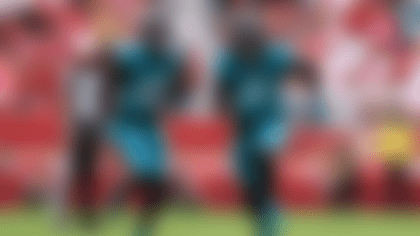Football might be the ultimate team sport, but the NFL is dominated by larger-than-life talents -- those players who, through sheer force of skill and personality, seem able to single-handedly drive their squads. A player like that can become everything to his organization, defining its identity and dictating its fortunes. In other words, he becomes the face of the franchise. Of course, though, one man can carry the franchise torch for only so long, as time is a cruel thief. Eventually, the onus falls on someone else.
Looking ahead to the 2014 season, Bucky Brooks has identified the face of each franchise, along with a player waiting in the wings to potentially take up the mantle in the future. Below you'll find analysis for each NFC North team. Click here to access the homepage of this division-by-division series.
Chicago Bears: Lance Briggs
Defense has been Chicago's backbone since the days of "Papa Bear," George Halas. Briggs, a seven-time Pro Bowler, replaced retired linebacker Brian Urlacher as the unit's leader last season, setting the tone with his ultra-aggressive demeanor, toughness and knack for playmaking -- but he missed much of the year with a shoulder injury, and the Bears struggled to stop opponents, finishing with the NFL's 30th ranked defense. In 2014, he'll anchor a defense that must play at an exceptional level to spark a playoff run.
Next in line: Jay Cutler. Cutler is entering his sixth season with the Bears -- and ninth in the NFL -- but he remains a mystery man from a leadership standpoint. Yes, his teammates have steadfastly supported him as a franchise quarterback since his arrival in Chicago in 2009, but it's time for the veteran to take his game to another level. Armed with a fat new contract (he signed a seven-year, $126 million extension in January, with $54 million guaranteed), Cutler will be expected to step to the fore as the Bears' unquestioned leader and guide the team back to championship contention.
Detroit Lions: Calvin Johnson
Megatron might not have broken any records in 2013 -- like he did in 2012 -- but the Pro Bowl wideout remains the most dangerous offensive weapon in the game. Johnson, who has compiled 45 receiving touchdowns over the past four seasons, averaged a ridiculous 17.8 yards per catch last year despite battling a balky knee that kept him from fully tormenting defenders with his speed and athleticism. With Johnson healthy and positioned to flourish in a more dynamic offensive system, the Lions have the ultimate playmaker to build around for the next few years.
Next in line: Matthew Stafford. For all the talk about Johnson carrying the franchise on his back, the Lions' future fortunes rest on the development of Stafford as a championship-caliber quarterback. The former No. 1 overall pick has flashed big-time ability and impressive arm talent, but his reckless style has resulted in costly turnovers at key moments. If Stafford can master the game-management aspect of the position under a new coaching staff, he could become one of the game's elite talents.
Green Bay Packers: Aaron Rodgers
Rodgers is the epitome of a franchise quarterback, consistently guiding the Packers into the postseason despite regularly dealing with shorthanded, injury-ravaged rosters. The MVP of Super Bowl XLV never lets circumstances get in his way, whether he's overcoming poor protection along the line, the inexperience of his receivers or a leaky defense that turns most contests into shootouts. Given the expectations associated with quarterback play in the NFL, Rodgers' reliable production -- until he missed seven games last season, Rodgers had started at least 15 games each year since becoming Green Bay's top dog in 2008 -- and winning ways make him the Packers' unquestioned leader.
Next in line: Eddie Lacy. The pass-centric nature of the NFL might relegate running backs to second-class citizenship, but the fact remains that Lacy's presence in Green Bay gives the Packers a legitimate chance to capture a second Lombardi Trophy under coach Mike McCarthy. Lacy burst onto the scene in 2013 with 1,178 yards, displaying a hard-nosed running style that's ideal for postseason play en route to capturing the Offensive Rookie of the Year Award. As the 30-year-old Rodgers ages gracefully in the pocket, Lacy's emergence as an elite runner could keep the team in the mix for the foreseeable future.
Minnesota Vikings: Adrian Peterson
Whatever the status of the running back position might be in the NFL, "All Day" remains the gold standard, based on his remarkable production and considerable talent. Peterson has single-handedly carried the Vikings' offense despite lacking a credible threat at quarterback since Brett Favre hung 'em up. In 2012, fresh off a serious knee injury, Peterson posted 2,097 yards rushing -- the second-highest total ever. While he had to settle for 1,266 in 2013, he continues to play at an elite level, handling a tremendous workload that would wear down most runners. Peterson has thrived amid the chaos in Minnesota, and there's no doubt about his importance to the organization.
Next in line: Teddy Bridgewater. The Vikings have been looking for a franchise quarterback to build around since Daunte Culpepper's heyday -- and Bridgewater appears to have the goods to end the slump. The former Louisville standout is a cerebral playmaker with the arm talent and pocket presence to thrive in Vikings offensive coordinator Norv Turner's system. A poor pro-day performance severely damaged Bridgewater's draft stock, but he was still the most polished pocket passer available, and his play in offseason workouts has created a buzz. Veteran QBs Matt Cassel and Christian Ponder lack the dynamic presence and game to take the Vikings' offense to another level -- meaning Bridgewater's day could come sooner rather than later.
Follow Bucky Brooks on Twitter @BuckyBrooks.












